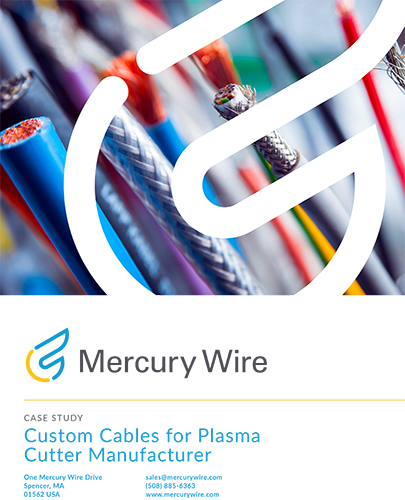Custom Cables for Plasma Cutter Manufacturer
About the Company
The Challenge
There is an expectation in the industry that companies like Hypertherm will continue to invest in rapid technological advancements. With shifting market expectations the expectation is continual and fast improvements. Hypertherm’s existing Leads, integral to the functionality of their cutting systems, began showing signs of obsolescence. The cables suffered from limited flexibility, diminished durability under extreme conditions, and a propensity for aesthetic degradation. Additionally, the absence of a standardized testing framework made it difficult to consistently produce cables that met the high-performance standards Hypertherm was known for. This situation posed a significant threat, not just to customer satisfaction, but to the company’s long-standing reputation for excellence.
The core challenge was multifaceted, requiring not only an improvement in the physical attributes of the Leads but also an overhaul of the testing and development process to foster innovation and ensure quality.
Hypertherm was facing several challenges with their existing push Leads, which are critical components for their plasma cutting torches. These challenges included:
- Stiffness: The cables were too stiff, making them difficult to maneuver and causing user fatigue.
- Durability: The cable jackets were susceptible to cracking and abrasion, leading to premature failure.
- Aesthetics: The cables had an outdated appearance that did not reflect Hypertherm’s brand image.
- Lack of Standardization: Hypertherm relied on a rudimentary testing process to assess cable quality, leading to inconsistencies.
These limitations were impacting Hypertherm’s ability to offer a best-in-class user experience and potentially hindering their market competitiveness.
The Solution
The solution emerged from a collaborative effort. Hypertherm partnered with Mercury Wire, a leading manufacturer of custom cable assemblies, to develop a new generation of Leads or plasma cutters. The partnership was built on a foundation of trust, shared goals, and a relentless pursuit of excellence. Through a collaborative effort, the two companies addressed the challenges as follows:
- Material Innovation: Mercury Wire explored alternative materials, eventually settling on a specialized rubber compound that offered superior flexibility while maintaining durability. This addressed the stiffness and durability concerns.
- Cable Design: The design team optimized the cable structure, incorporating twisted pairs for improved electrical performance and different tape wrapping techniques to achieve a smoother, more aesthetically pleasing appearance.
- Standardized Testing: Hypertherm with input from Mercury Wire developed a standardized testing process to ensure consistent cable quality throughout production. This eliminated the reliance on the “back of the truck” test previously used by Hypertherm.
- Weekly Collaboration: Regular meetings between engineers from both companies fostered open communication and problem-solving, allowing for continuous improvement throughout the development process.
The Results
- Increased Flexibility: The rubber compound provided a much more user-friendly experience, reducing operator fatigue and improving maneuverability.
- Enhanced Durability: The new cable jacket material offered superior resistance to cracking and abrasion, leading to a longer lifespan.
- Modern Aesthetics: The improved cable design resulted in a sleeker, more modern appearance that aligned better with Hypertherm’s brand image.
- Consistent Quality: The standardized testing process ensured consistent cable performance across production batches.
- Increased Sales: The improved cable performance and aesthetics contributed to a significant increase in sales of Hypertherm’s cutting systems with the new cables.
